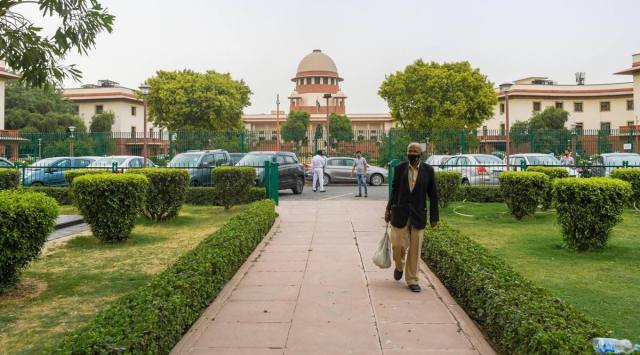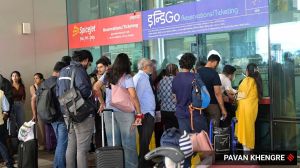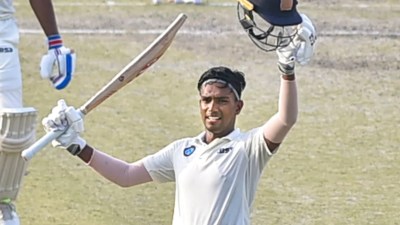
The Advocate General said, “That’s the aim, and if that aim is achieved, then the purpose for which the exercise was undertaken should come to an end.”
 Supreme Court of India
Supreme Court of India
The bench, presided by Chief Justice of India D Y Chandrachud, comprises Justices B R Gavai, Vikram Nath, Bela M Trivedi, Pankaj Mithal, Manoj Misra and Satish Chandra Sharma.
It is also examining the validity of the Punjab Scheduled Castes and Backward Classes (Reservation in Services) Act, 2006 which provided 50 per cent quota and first preference to Valmikis and Mazhabi Sikhs in public jobs within the quota meant for the Scheduled Castes. In 2010, the Punjab and Haryana High Court struck down Section 4(5) of the Punjab law as unconstitutional, one of the grounds being that it violated the judgement in the Chinnaiah case.
Taking Justice Nath’s comments further, Justice Gavai posed a question about children of a reserved category IAS, IPS or IFS officer continuing to avail benefits of reservation.
“With regard to concern expressed by my well-learned brother, Vikram Nath, if within a particular backward class, certain castes have reached that position and they are on par, then they should move out, but that’s again for Parliament… As we are deciding an important issue, just giving a thought for consideration of all. Now what happens. A person from a Scheduled Caste or Scheduled Tribe gets into IPS. So once he’s an IPS, IFS, his children don’t suffer the disadvantages that persons from the category who are residing in the villages suffer. But then, by virtue of reservation, they are also entitled to get it (reservation) the second generation and again the third generation,” he said.
Story continues below this ad
The Advocate General replied that after the Supreme Court ruling in the Jarnail Singh vs Lacchmi Narain Gupta matter, the creamy layer concept was applicable for SCs and STs too. In that 2018 judgement, the Supreme Court had upheld reservation in promotions for SCs/STs in public employment.
Gurminder Singh said that not making special provisions for the more backward among the backward will lead to “lumping of benefits” in a certain class.
“Even if somebody is an Inspector, his family has made it. His children will go to a good school, he will be in a city or a town or an urban estate. But for somebody who is still sitting in that part of the village from where you are not allowed to draw water from the well, he is the one who needs it. You cannot allow lumping of benefits within a certain class within a class. And if touching that class within a class is taken to be tinkering of Article 341 (as decided by Chinnaiah), that would be an erroneous legal view,” he said.
Singh said while it was within the power of Parliament to decide who gets in or leaves the Presidential list, it was up to the States to decide how to implement it. He contended that making provision for the more backward classes within the backward should not be seen as exclusionary.
Story continues below this ad
To this, the CJI said there is an exclusion which is also what applies in the matter of providing reservation to backward castes vis-a-vis forward castes, and wondered if it cannot be extended to give special benefits to the more backward among the backward class.
“There is an element of exclusion. Let’s not gloss over it. Because the same exclusion applies to reservation per se. Once posts are reserved for a backward community, there is necessarily an exclusion of the forward community in competing for those posts. Yet our Constitutional jurisprudence permits it because we treat equality as a substantive equality, not formal equality. Therefore, post N M Thomas ( the 1976 ruling in State of Kerala vs N M Thomas), we have now developed jurisprudence to the effect that reservation is not really a breach of equality,” he said.
“Interestingly, the same argument that applies for reservation for backward communities as a block, backward versus forward, would also apply within the backward community because what we are really now doing here by the measure which the Punjab legislature brought about was this: That within the reservation of seats for Scheduled Castes, a certain percentage is reserved for Mazhabi Sikhs and Valmikis. Other backward castes cannot compete for those posts which are set apart for them. So, in a sense, it is exclusionary…We cannot gloss over the point,” he said.
“The only question really is this: Can that exclusion not be justified on the same yardstick that we have applied for exclusion in the backward-versus-forward context?… Can the State not say I am not deleting your community from the list of Scheduled Castes which has been designated by the President… but within those communities, I am now making a classification that certain communities are more backward and, therefore, in greater need for protection on the same touchstone of substantial equality?” the CJI said.
Story continues below this ad
The Advocate General said, “It’s about relative backwardness. Once we concede to the argument of relativity in backwardness, and it is the backwardness vis-a-vis the forwardness which brings them in the 50% and it is the more backwardness which gives them the reservation within the reserved, then this argument has no problem.”
Article 341 of the Constitution authorises the President to declare certain castes and classes as Scheduled Castes in a State or a Union Territory. It also states that the Parliament can include or exclude any caste or tribe from the list.
Singh said “no one intended reservation to be a perpetual concept. Nobody, not even the Constitution framers… We have had studies, we had the Mandal Commission, we had judgements. Nobody wanted that reservation should remain in perpetuity because eventually then that would mean that the exercise of reservation itself has failed. The idea is to achieve equality in the lowest time frame possible”.
The hearing will resume Wednesday.



 Supreme Court of India
Supreme Court of India





